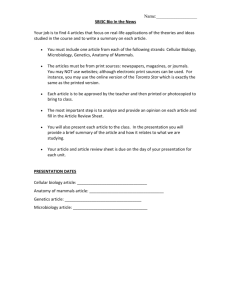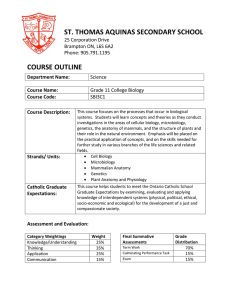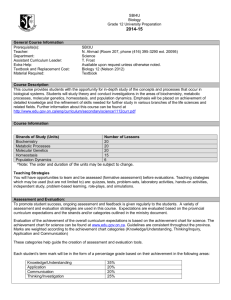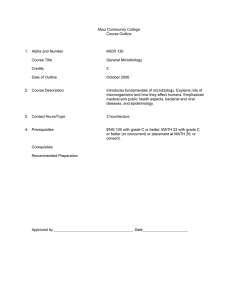St. Roch Catholic Secondary School Science Department
advertisement
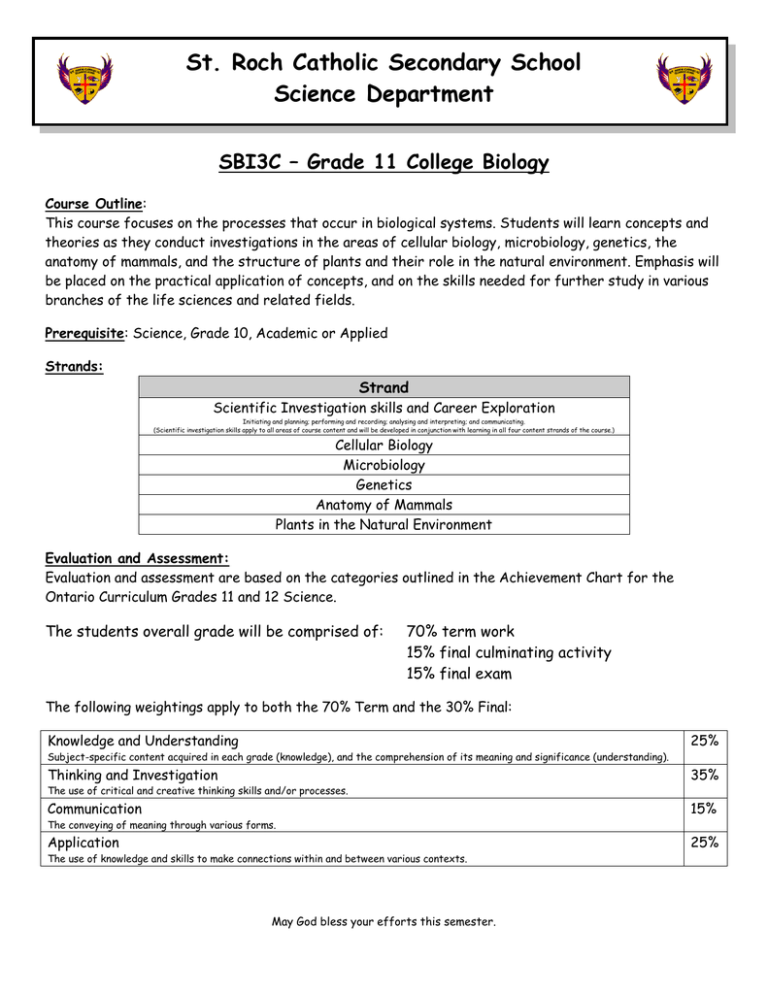
St. Roch Catholic Secondary School Science Department SBI3C – Grade 11 College Biology Course Outline: This course focuses on the processes that occur in biological systems. Students will learn concepts and theories as they conduct investigations in the areas of cellular biology, microbiology, genetics, the anatomy of mammals, and the structure of plants and their role in the natural environment. Emphasis will be placed on the practical application of concepts, and on the skills needed for further study in various branches of the life sciences and related fields. Prerequisite: Science, Grade 10, Academic or Applied Strands: Strand Scientific Investigation skills and Career Exploration Initiating and planning; performing and recording; analysing and interpreting; and communicating. (Scientific investigation skills apply to all areas of course content and will be developed in conjunction with learning in all four content strands of the course.) Cellular Biology Microbiology Genetics Anatomy of Mammals Plants in the Natural Environment Evaluation and Assessment: Evaluation and assessment are based on the categories outlined in the Achievement Chart for the Ontario Curriculum Grades 11 and 12 Science. The students overall grade will be comprised of: 70% term work 15% final culminating activity 15% final exam The following weightings apply to both the 70% Term and the 30% Final: Knowledge and Understanding 25% Thinking and Investigation 35% Communication 15% Application 25% Subject-specific content acquired in each grade (knowledge), and the comprehension of its meaning and significance (understanding). The use of critical and creative thinking skills and/or processes. The conveying of meaning through various forms. The use of knowledge and skills to make connections within and between various contexts. May God bless your efforts this semester. The report card provides a record of the learning skills demonstrated by the student in every course, in the following six categories: Responsibility; Organization; Independent work; Collaboration; Initiative; Self-Regulation. The learning skills are evaluated using a four-point scale: E–Excellent, G–Good, S–Satisfactory, N–Needs Improvement For each of these six categories of learning skills, a checklist of sample behaviours is provided. The checklists are designed to assist, but not to limit or confine, teachers in their observations. Responsibility Organization Independent Work Collaboration Initiative Self-Regulation fulfils responsibilities and commitments within the learning environment completes and submits class work, homework, and assignments according to agreed-upon timelines takes responsibility for and manages own behaviour devises and follows a plan and process for completing work and tasks establishes priorities and manages time to complete tasks and achieve goals identifies, gathers, evaluates, and uses information, technology, and resources to complete tasks independently monitors, assesses, and revises plans to complete tasks and meet goals uses class time appropriately to complete tasks follows instructions with minimal supervision accepts various roles and an equitable share of work in a group responds positively to the ideas, opinions, values, and traditions of others builds healthy peer-to-peer relationships through personal and media-assisted interactions works with others to resolve conflicts and build consensus to achieve group goals shares information, resources, and expertise and promotes critical thinking to solve problems and make decisions looks for and acts on new ideas and opportunities for learning demonstrates the capacity for innovation and a willingness to take risks demonstrates curiosity and interest in learning approaches new tasks with a positive attitude recognizes and advocates appropriately for the rights of self and others sets own individual goals and monitors progress towards achieving them seeks clarification or assistance when needed assesses and reflects critically on own strengths, needs, and interests identifies learning opportunities, choices, and strategies to meet personal needs and achieve goals perseveres and makes an effort when responding to challenges
